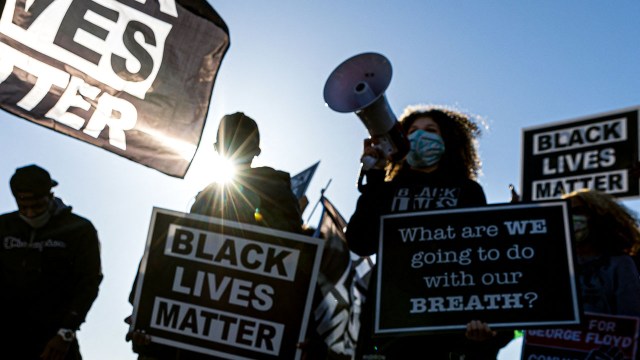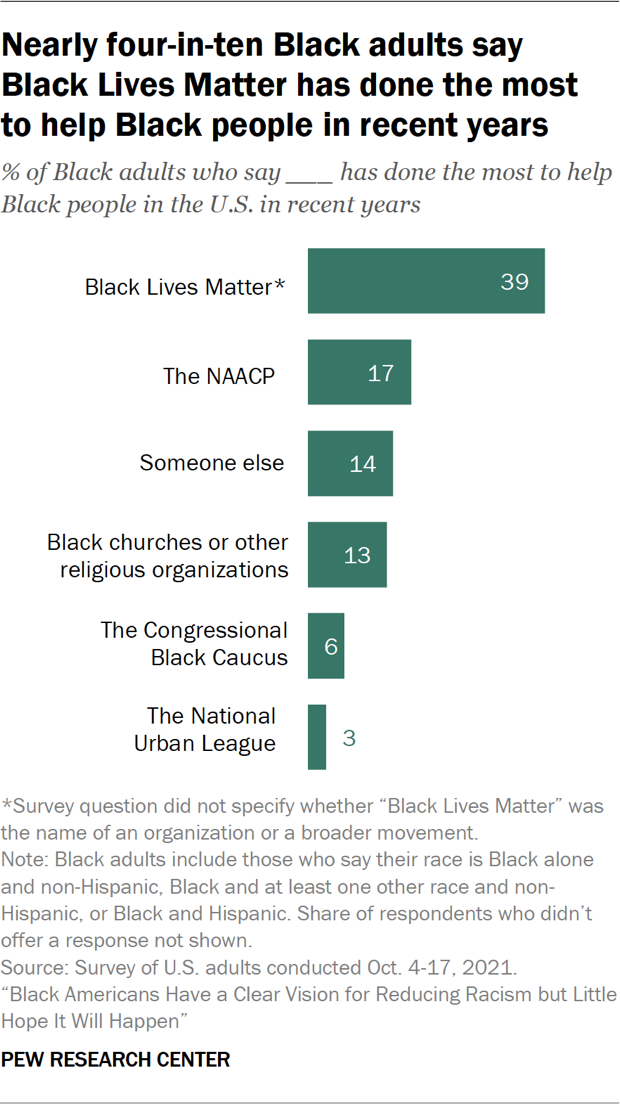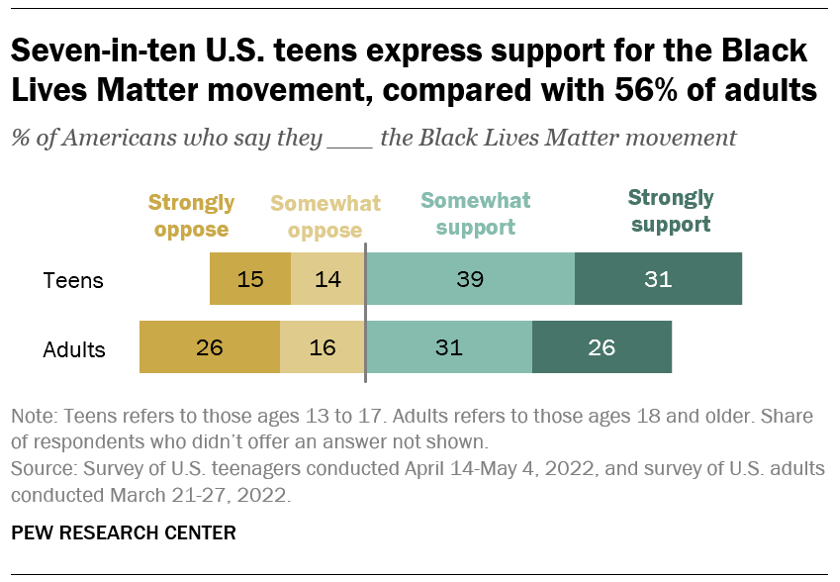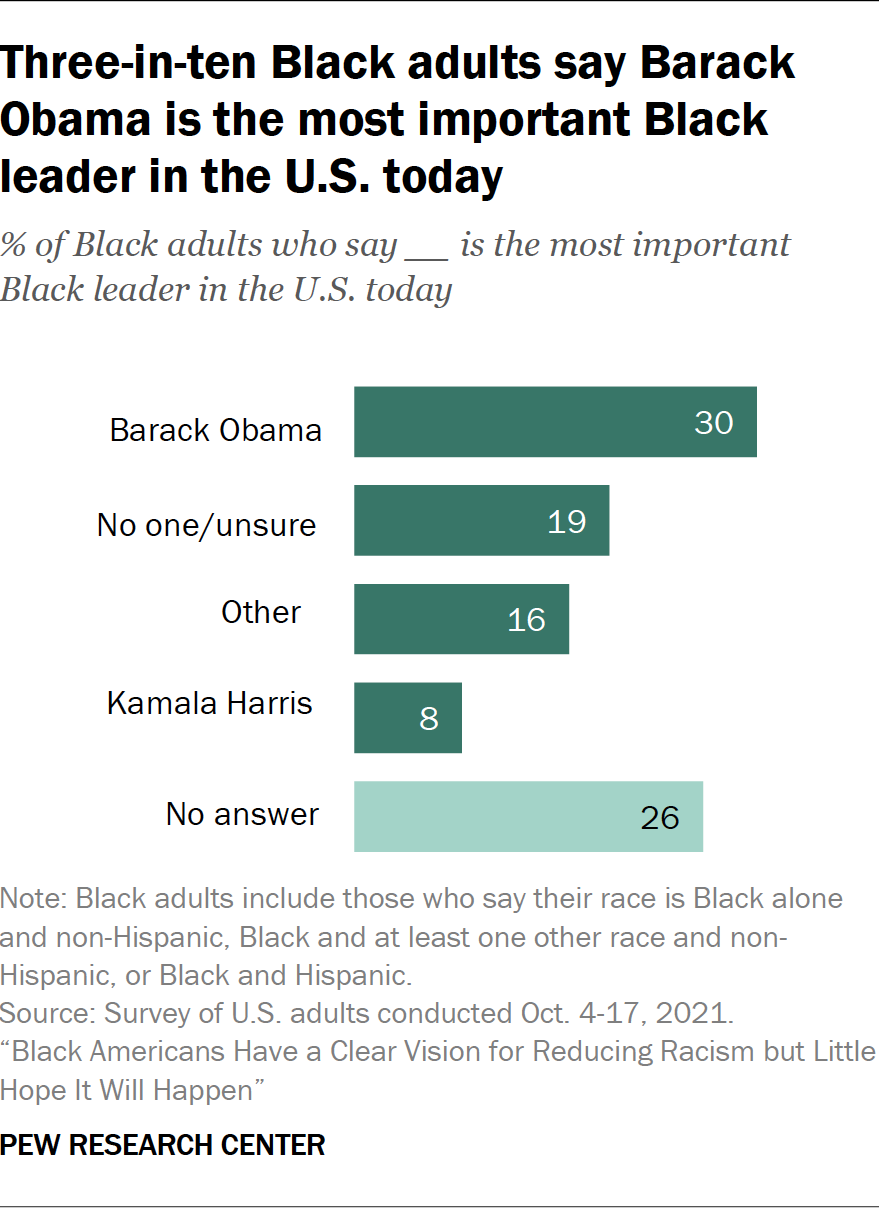

Around four-in-ten Black adults in the United States (39%) say Black Lives Matter has done the most to help Black people in recent years, far exceeding the share who say the same about other groups or organizations, according to a recent Pew Research Center survey.
By comparison, around one-in-five Black adults (17%) say the NAACP has done the most to help Black people in the U.S. in recent years and 13% say the same about Black churches or religious organizations. Smaller shares point to the Congressional Black Caucus (6%) and the National Urban League (3%), while 14% of Black adults choose someone else.
The survey provided respondents with a set of answer options and did not specify whether Black Lives Matter was the name of an organization or the broader protest movement. But regardless of how respondents interpreted the term, Black Lives Matter outranked the other entities that were asked about.
The question was part of an October 2021 survey that examined Black Americans’ views of their position in U.S. society and their attitudes about social change. The survey included Black adults who are single-race, non-Hispanic; those who are multiracial, non-Hispanic; and those who indicate they are Black and Hispanic. It was conducted prior to allegations of financial mismanagement at a foundation that grew out of the Black Lives Matter protest movement.
This Pew Research Center analysis examines Black Americans’ attitudes about the groups and leaders they see as most helpful and important today. It relies primarily on an online survey conducted Oct. 4-17, 2021, among 3,912 Black U.S. adults, including those who are single-race, non-Hispanic; those who are multiracial, non-Hispanic; and those who indicate they are Black and Hispanic. The survey included 1,025 Black adults on Pew Research Center’s American Trends Panel (ATP) and 2,887 Black adults on Ipsos’ KnowledgePanel.
Respondents on both survey panels are recruited through national, random sampling of residential addresses. Recruiting panelists by phone or mail ensures that nearly all Black U.S. adults have a chance of selection. This gives us confidence that any sample can represent the whole population. (See our Methods 101 explainer on random sampling.) Here are the questions used for the survey of Black adults, along with responses, and its methodology.
This analysis also includes additional data from other recent Pew Research Center surveys about how the broader U.S. public, including adults and teens ages 13 to 17, see the Black Lives Matter movement. Links to these surveys, including information about the field dates, sample sizes and other methodological details, are available in the text.
The survey highlighted differences of opinion among Black Americans on many questions, including – at least to some extent – the perceived importance of Black Lives Matter for helping Black people. For example, Black adults who identify with or lean toward the Democratic Party are more likely than those who identify with or lean toward the Republican Party to say Black Lives Matter has done the most to help Black people in recent years (44% vs. 26%). Similarly, almost half of Black adults who describe their political views as liberal (47%) say the same about Black Lives Matter, compared with smaller shares of Black moderates (41%) and Black conservatives (32%).

Among the broader public, a little over half of U.S. adults (56%) say they strongly or somewhat support the Black Lives Matter movement, according to a separate Pew Research Center poll conducted in March 2022. (The March 2022 survey asked about Black Lives Matter as a “movement,” unlike the October 2021 survey.)
Among U.S. teens, support for the Black Lives Matter movement is higher than it is among adults. Seven-in-ten teens ages 13 to 17 say they strongly or somewhat support the movement, according to a survey conducted in April and May 2022.
Black Americans see Obama as most important Black leader today
The October 2021 survey of Black adults also asked respondents, in an open-ended format, to identify the Black leader they see as most important in the U.S. today.

Three-in-ten Black adults volunteer former President Barack Obama, the nation’s first Black chief executive, while 8% name current Vice President Kamala Harris, the first Black person ever to serve in that role. Around one-in-five Black adults (19%) say they are not sure who the country’s most important Black leader is, while 16% cite someone other than Obama or Harris, including small percentages who name leaders such as current Georgia gubernatorial candidate Stacey Abrams, the Rev. Jesse Jackson or the Rev. Al Sharpton.
As is the case in Black adults’ views of Black Lives Matter, there are partisan differences in perceptions of the nation’s most important Black leader. Black Democrats are about twice as likely as Black Republicans (35% vs. 16%) to volunteer Obama, while Black Republicans are more likely than Black Democrats (33% vs. 18%) to say they are not sure. Among ideological groups, four-in-ten Black liberals name Obama, compared with three-in-ten Black moderates and around a quarter of Black conservatives (23%).
While there are age differences in Black Americans’ views on several questions in the Center’s recent survey, there are no such differences when it comes to perceptions of Obama as the most important Black leader in the U.S. today. Black adults under 50 are just as likely as those ages 50 and older to volunteer Obama as the most important Black leader: 30% in each group name the former president.